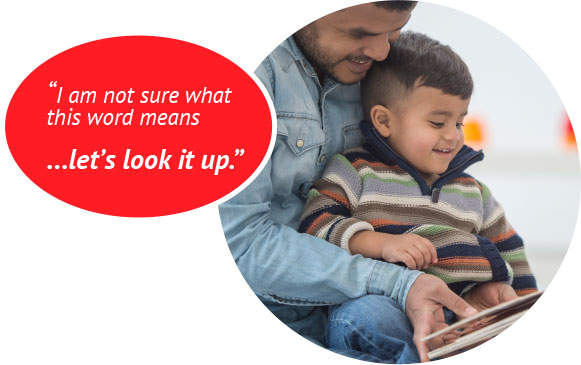
For preschoolers, literacy is many things, not just reading and writing.
- Preschoolers need to know that people read and write the print that is all around them.
- They need to know that there are reasons to read, write, and use mathematics.
- We need to help them understand and enjoy stories, and encourage them to experiment with reading and writing.
- We should let them know that letters, numbers, words, sentences, and punctuation marks exist, and know their names.
- Most important, we need to build on their curiosity to help them want to know what people are reading, writing, and calculating.
Think about these questions:
√ | Where is the literacy potential in my home environment? |
√ | How can I help my child notice my reading, writing, and math and understand the purpose? |
√ | How can I increase the amount of interaction about print, numbers, and stories between my child and me? |
Where is the literacy potential in my home environment?
You might sit down and think about the ways that you use literacy or could use literacy already in your home. Your list might look like this:
-
Grocery Lists:
I look in the cupboard and refrigerator and write things down, talking (signing) to myself as I go, or I empty the carton of milk and write MILK on the list on the refrigerator door. -
Family Memos:
There is a white board by the door or the telephone. Before I leave the house, I usually leave a message for my spouse or an older child, saying, "Gone to store. Be right back. Love you." -
Children's Books:
My older children bring me a book every night before bed and ask me to read it to them. Sometimes we read a chapter a night. Sometimes, it is the same book over and over. -
Accessible Paper:
There is a drawer with all kinds of paper (newsprint, old blank checks, lined paper, ends of spiral notebooks) and writing utensils (pencils, ball point pens, crayons, gel pens) for experimenting with drawing and writing any time. Sometimes we turn the T.V. off and suggest that the children read or draw or write.
How can I help my child notice my reading, writing and math and understand the purpose?
You have your list of literacy in your home. Now you have to decide, "how can I call my child's attention to all the reading and writing and calculating that happens every day?” Add some more items to the list.
- I can "think out loud" when I use reading, writing and math in my daily life: "This cereal box is almost empty. I will write 'cereal' on the list." "Look how much this new cereal costs. Do I have enough money?"
- I can talk to someone else about what I am reading, writing, or calculating:
Mom says to an older child: "The paper says there will be snow. Where is your winter coat?" Child says: "I put it in the closet. I'll get it." - I can involve my deaf or hard-of-hearing child in the conversation: "This letter is for Daddy. Give it to Daddy."
- I can involve my deaf or hard-of-hearing child in the act of reading or writing or using numbers. "Let's write Daddy a note. `Mommy and Evan are at the store.' You write your name."
- "There's the pop machine. It costs 75 cents. You put in the money. See, the machine says how much you put in. Now it is 75. You can push the button."
How can I increase the amount of interaction about print, numbers and stories between my child and me?
On another page, put a list of things that you could do to increase the print in the environment or the ways that you call your child's attention to it. One easy entry could read: "I can follow all the conversation suggestions on other pages of this website, especially:
Building Conversations,
Building Concepts, and
Read with Me."
- "I can increase the amount of functional print available in the environment:
- if I use closed captioning for television shows and movies when my child is in the room,
- if the family writes and signs group birthday cards, valentines, and holiday greetings, and
- if I label drawers, cupboards and closets with pictures and category names for their contents (e.g. dishes, glasses, coats and boots, Susie's clothes, Mommy's clothes, pots and pans)."
- "I can increase my child's attention to literacy if I pay attention when my child expresses even nonverbal interest in print or numbers in the environment, asking me to read them, name them or tell what they mean."
- "I can read out loud the letters and cards that arrive from friends and family members."
Suggested Readings:
For Additional Information: